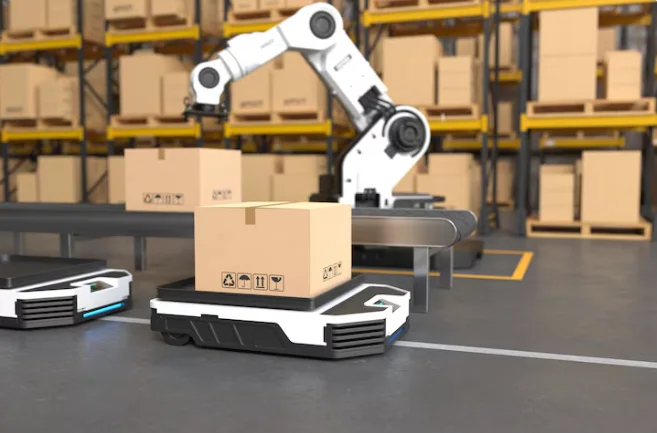Artificial intelligence and automation are reshaping freight logistics as global demand for faster, leaner, and smarter shipments grows. The worldwide logistics automation market is evolving rapidly, projected to grow from about USD 78 billion in 2024 to over USD 125 billion by 2033, while the AI in transportation and logistics market alone could expand from USD 5.8 billion in 2024 to USD 23.1 billion by 2032 at a CAGR of 18.5 %. Real‑time automation, smart warehouses, and intelligent transport networks are all becoming essential as freight volumes keep rising ahead of 2026.
Predictive analytics and smart routing are key innovations powering this transformation. Uber Freight’s AI‑powered platform, launched in 2023, uses machine learning to match truckers with continuous loads and optimize transit paths, cutting empty miles by 10–15 % and significantly improving overall utilization. With intelligent systems evaluating traffic, weather, load factors, and road conditions in real time, freight operators can proactively reduce delays, lower fuel costs, and boost delivery reliability.
Predictive Analytics for Smarter Decision-Making
Predictive analytics is revolutionizing logistics by enabling proactive decision-making through data-driven insights. By analyzing historical data, market trends, and external factors, businesses can forecast demand more accurately, plan shipments efficiently, and identify potential risks before they impact operations. This approach enhances supply chain resilience and operational efficiency.
Real-world applications demonstrate the effectiveness of predictive analytics in logistics. For instance, JusDA’s JusLink platform employs AI-driven predictive maintenance to anticipate equipment failures, reducing downtime and ensuring smooth operations. Similarly, predictive analytics allows logistics providers to optimize transportation routes and schedules, improving overall efficiency and reducing costs.
The benefits of predictive analytics extend to global supply chain resilience. By anticipating disruptions such as weather events, geopolitical instability, or supply shortages, companies can implement contingency plans and adjust operations accordingly. This proactive approach minimizes delays, maintains service levels, and enhances customer satisfaction, ultimately strengthening the resilience of the global supply chain.
Smart Routing and Real-Time Optimization
AI-powered routing systems are transforming logistics by significantly reducing transit times and operational costs. These systems leverage real-time data, including traffic patterns, weather conditions, and road infrastructure, to dynamically adjust routes. For instance, Descartes’ AI route optimization helps delivery operations overcome real-time challenges like traffic, delivery windows, and service times, leading to improved efficiency and cost savings.
The integration of live traffic, weather data, and infrastructure conditions allows for continuous route adjustments, ensuring timely deliveries and minimizing delays. NextBillion.ai highlights that integrating real-time traffic data leads directly to lower fuel bills, as every route is optimized for current conditions, not just the shortest path on a map.
Real-world applications demonstrate the effectiveness of AI in logistics. For example, UPS’s ORION optimization system has saved the company 10 million gallons of fuel annually by optimizing delivery routes. Similarly, Uber Freight has reduced empty miles by 10–15% by using AI-driven platforms to match truckers with continuous loads, minimizing wasted fuel and emissions.
These advancements in smart routing contribute to global supply chain resilience by enhancing efficiency, reducing costs, and improving delivery reliability. As AI continues to evolve, its role in logistics is expected to expand, offering even greater optimization and adaptability in an increasingly complex global market.
Automation Across Freight Operations
Automation is revolutionizing freight operations by streamlining critical processes such as warehousing, cargo handling, and shipment tracking. In warehouses, technologies like Automated Guided Vehicles (AGVs) and robotic arms are enhancing efficiency in tasks such as picking, packing, and sorting. For example, DHL has deployed Stretch robots, achieving nearly double the unloading rate of human workers. These advancements not only reduce labor costs but also minimize human error, leading to more accurate and timely deliveries.
In the realm of customs documentation and compliance, AI-driven automation is playing a pivotal role. Solutions like Digicust and Virtual Workforce AI are utilizing artificial intelligence to automate the extraction, classification, and validation of customs data from documents and emails. This approach accelerates the clearance process, reduces manual errors, and ensures compliance with international trade regulations.
Emerging technologies are further shaping the future of logistics. The integration of Internet of Things (IoT) devices, real-time analytics, and generative AI is enhancing visibility and decision-making capabilities across the supply chain. These technologies enable proactive identification of potential disruptions, optimization of routes, and improved inventory management, contributing to more resilient and agile logistics operations.
Collectively, these automation technologies are not only improving operational efficiency but also enhancing the resilience and adaptability of global supply chains. As the logistics industry continues to evolve, embracing automation and emerging technologies will be crucial for staying competitive and meeting the demands of a dynamic market.
Driving the Future of Freight with AI and Automation
AI and automation are fundamentally transforming global freight operations by enhancing efficiency, reducing costs, and improving reliability. Predictive analytics enables smarter decision-making through accurate demand forecasting and risk mitigation, while AI-powered routing systems optimize transit times and adapt to real-time conditions. Automation in warehousing, cargo handling, and compliance further streamlines operations, minimizing errors and accelerating workflows. Together, these technologies strengthen supply chain resilience and enable logistics providers to respond proactively to disruptions.
Specialized software development plays a critical role in implementing these advanced solutions. Tailored platforms integrate AI-driven insights, automation tools, and real-time data streams to create cohesive systems that improve operational performance and support strategic decision-making. Companies that adopt these technologies gain a competitive advantage through faster deliveries, optimized routes, and efficient resource allocation.
COAX leverages its expertise in logistics and transportation software development to deliver customized solutions for global freight operations. By combining AI, automation, and intelligent software design, COAX helps businesses optimize processes, reduce costs, and enhance overall supply chain performance. These innovations position logistics providers to meet the demands of an increasingly complex and interconnected global market.


